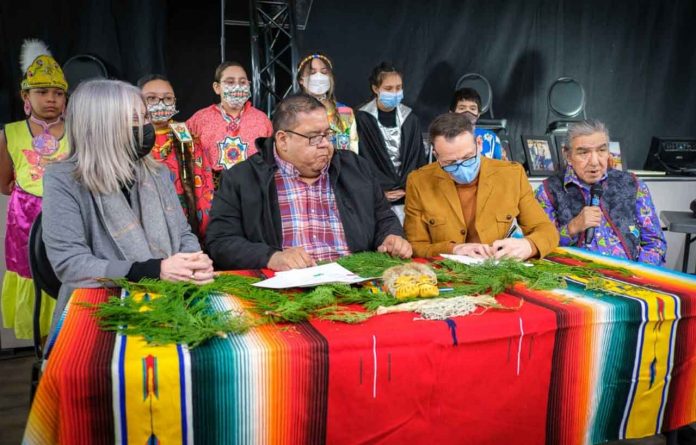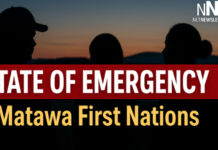WABASEEMOONG INDEPENDENT NATIONS, TREATY 3 – When all partners and orders of government work together to put the interests of Indigenous children first, everyone benefits. Most importantly, when First Nations can exert their jurisdiction over child and family services, it means their children and youth can remain connected to their families and communities, surrounded by their culture.
“I think today is a day that can once again show that we as leadership take the future of our youth seriously, we look at them as our future and we need to do what is best for our children. We need to lead our youth with love, tradition, culture and their community. We have a way to go with reconciliation in this country, but this partnership is an example and a step in the right direction. By letting Indigenous communities take the lead and working in partnership, you can see by this historic event the strides that can be made, and making those changes for the youth is fundamental in all the work we do,” said Chief Waylon Scott, Wabaseemoong Independent Nations.
In an historic first in Ontario, Chief Waylon Scott, Wabaseemoong Independent Nations, the Honourable Patty Hajdu, Federal Minister of Indigenous Services, the Honourable Dr. Merrilee Fullerton, Ontario Minister of Children, Community and Social Services and the Honourable Greg Rickford, Ontario Minister of Indigenous Affairs signed a trilateral coordination agreement for child and family services. The signing was celebrated today at a ceremony in Wabaseemoong’s community.
Greg Rickford, Minister of Indigenous Affairs says, “Wabaseemoong Independent Nations have charted their own path when it comes to child and family services, especially through the development and implementation of the Wabaseemoong Customary Care Code. Today’s landmark agreement is a testament to the community’s commitment to Wabaseemoong children and families.”
This coordination agreement supports Wabaseemoong Independent Nations’ Customary Care Code which has had force of federal law since January 8, 2021. The Code supports Wabaseemoong’s exercise of jurisdiction over Wabaseemoong children and families. The coordination agreement outlines the roles and responsibilities of all parties to support coordination of child and family services. It also provides for mechanisms to address funding from the federal and provincial governments to ensure the necessary financial resources are in place.
This is the first coordination agreement signed in Ontario and the second in Canada since the federal legislation An Act respecting First Nations, Inuit and Métis children, youth and families came into force in 2020.
Having a child and family services law was always of integral importance to Wabaseemoong Independent Nations. The community began developing its law at a community planning level in 2011. Leadership recognized the work needed at the grass roots level to ensure its success. Culture and tradition are of the upmost importance for Wabaseemoong Independent Nations, and so this work began in ceremony. The community worked closely and collectively with the elders, youth and community members to bring to life what you see today.
Wabaseemoong Independent Nations have always honoured their youth by ensuring they are a central focus to create a better future. In honouring this approach, leadership of Wabaseemoong Independent Nations approved the Wabaseemoong Independent Nations Customary Care Code in 2017 with the leadership of youth.
The signing of the trilateral coordination agreement on child and family services is a culmination of the hard work by Wabaseemoong Independent Nations and partners over many years and will have lasting impacts for generations to come.
“I congratulate Wabaseemoong Independent Nations and the many partners and advocates who have worked over the past number of years to make this coordination agreement happen. This is an historic first in the Province of Ontario, the second in Canada, and is leading the way for many others to follow in the months and years ahead. When all orders of government work together, we can ensure that First Nations children and families have the supports and services they need, but most importantly ensure those supports are First Nations-led, under First Nations jurisdiction, and maintaining crucial connections to their culture and community,” states Patty Hajdu, Minister of Indigenous Services.
“Indigenous children are the future leaders of their communities, and Indigenous communities are best placed to lift up their families and support their children. I want to congratulate Wabaseemoong Independent Nations, and all involved in today’s announcement. Respecting Wabaseemoong Independent Nation’s inherent right to have jurisdiction of their child and family services is an important step towards our shared goal of ensuring the safety and well-being of all Indigenous children,” added Marc Miller
Minister of Crown-Indigenous Relations and Northern Affairs.






